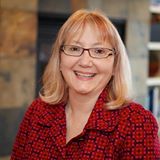Many people are glad that former Kirkland mayor Joan McBride is taking on Rodney Tom in the primary for the 48th District Senate seat. Tom is the Bellevue Democrat who infuriated his own party by joining with Republicans to take over the Senate. Mainstream Democrats want Tom out, and they want him out badly.
Liz Berry is jazzed about McBride’s campaign for a different reason—her gender. Berry, the incoming president of the National Women’s Political Caucus of Washington, notes what she sees as a worrying trend. In 2000, 40 percent of the state’s legislators were women. Today, 32 percent are. While that still puts Washington ahead of the national average, Berry says, “We’ve slipped.” Now that the legislative session is over and politicos are turning their attention to the November election, Berry is ramping up her attempt to get as many women as possible into the ring. She’s been meeting women for coffee, asking them to run and helping to put on a training workshop for potential female candidates.
The task isn’t easy. “They say you have to ask a woman seven times before she runs for office,” Berry says. Women, she elaborates, tend to be more insecure than men about their qualifications, more concerned about how politics would affect their work-life balance and less likely to have connections with potential campaign donors. The 31-year-old Berry, who would like to run for office herself someday and previously worked as legislative director for former Congressmember Gabrielle Giffords of Arizona, says she understands such concerns. “I feel those insecurities myself,” she says.
In contrast, “men get up in the morning and say, ‘I should run for office,’” observes Lisa MacLean, founding president of the political consulting firm Moxie Media. She has also found persuading women to run a more elaborate process, but one she says is important to achieve “gender balance in government.”
A new PAC, called Win with Women-Washington, aims to get more women elected to the legislature as well, although it narrows its support to “progressive” candidates. The National Women’s Political Caucus has a litmus test too—candidates must be pro-choice—but will support women of either party, according to Berry.
She is encouraged by a half-dozen legislative races so far that feature a female contender. Among them is the race for the open 37th District Senate seat created when Adam Kline retired. Berry was involved with a coalition that asked Pramila Jayapal, the dynamic founder of the immigrant advocacy group OneAmerica, to run for the south Seattle seat. A woman, concert pianist Irene Bowling, is also running in the primary against Tom Sheldon, the other renegade Democrat who joined in the Senate coup.
By far, though, the McBride-Tom match-up is the hottest legislative race going. Not only is control of the Senate in the balance, but Tom’s position as that chamber’s majority leader makes makes him a powerful figure to go up against.
Talking with Seattle Weekly by phone today, McBride says her campaign “couldn’t be going any better.” The 62-year-old, who recently married her longtime female partner, says she’s racked up a ton of endorsements, including from the mayors of the three biggest cities in her district: Kirkland, Bellevue and Redmond. She says U.S. Rep. Adam Smith, the Tacoma Democrat, also called her out of the blue the other day to offer his endorsement. She hadn’t even asked.
While party politics loom large over the race, it seems likely gender issues will creep in. When SW noted that Tom is pro-choice, McBride asked pointedly: “Is he? Where’s the Reproductive Parity Act?” That was the act, introduced in the 2013 session, that would have required health plans covering maternity care to also cover abortion. Tom repeatedly said he supported the bill, but he didn’t as majority leader get it to the floor for a vote—something McBride holds against him.
“Half of this district are women and we care about our reproductive health,” says McBride, signaling a campaign theme in the making.
She says she, too, wants to see more women in office, and not just herself. “We are losing our numbers,” she says, noting not just the legislative scene but a dearth of female council members on the Eastside, particularly in Bellevue and Redmond. She maintains that rectifying that situation “is one of the most important things we can do.”








